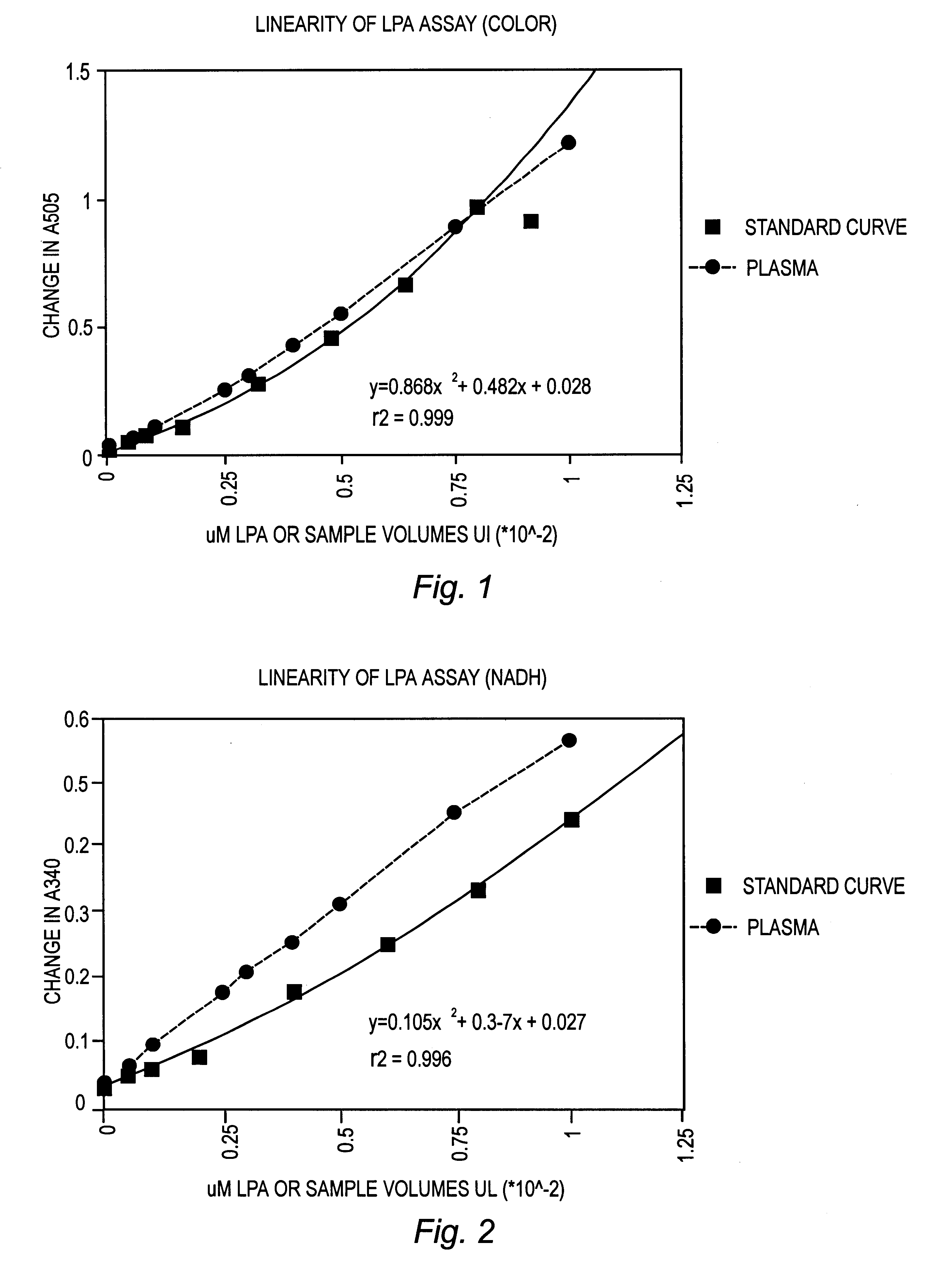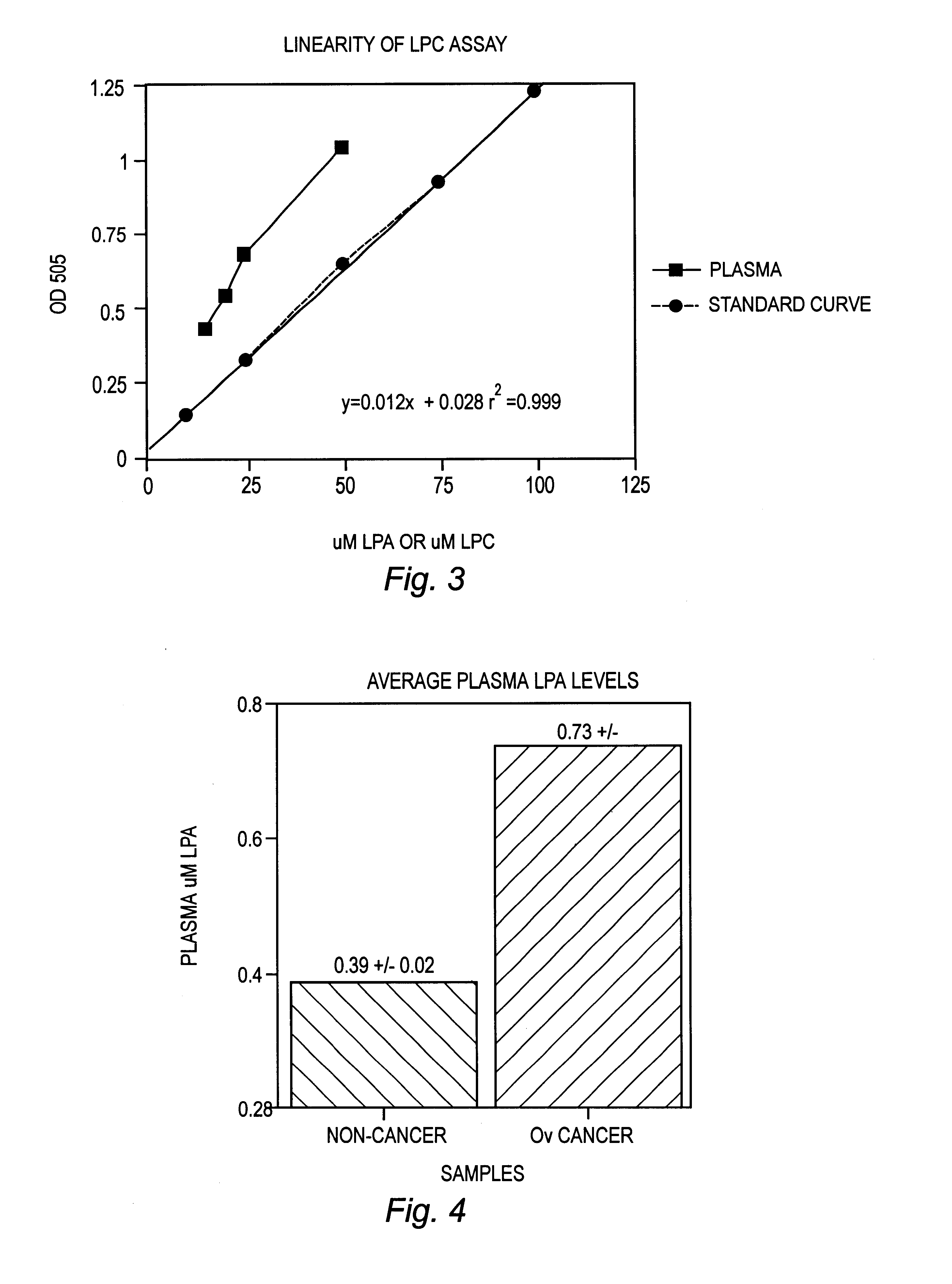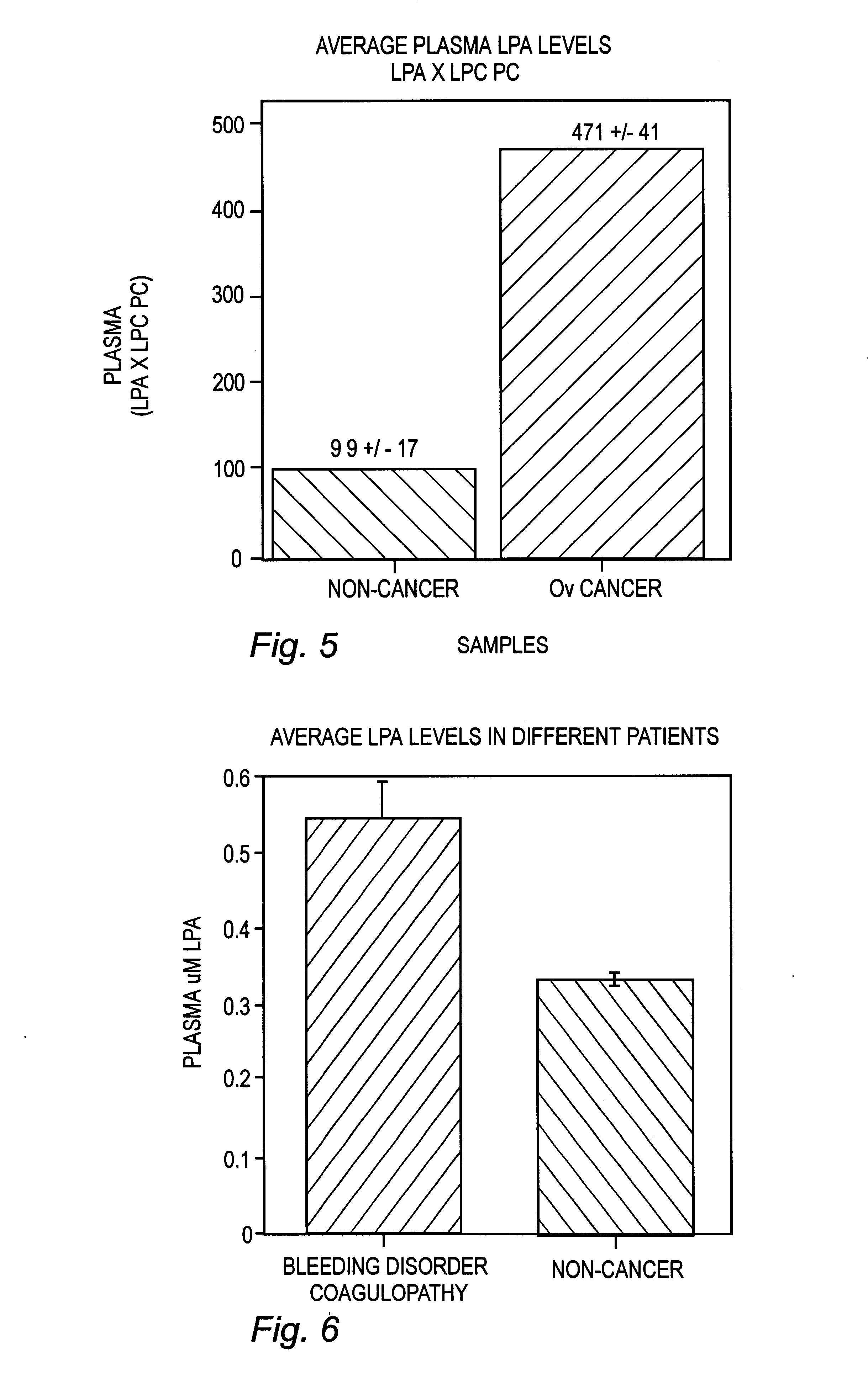Enzyme method for detecting disease conditions by measuring lysophosphatidic acid
a technology of lysophospholipids and enzymes, applied in biochemistry apparatus and processes, instruments, material analysis, etc., can solve the problems of time-consuming, variable, expensive, etc., and achieve the effect of reducing the background concentration of contaminating lipids
- Summary
- Abstract
- Description
- Claims
- Application Information
AI Technical Summary
Benefits of technology
Problems solved by technology
Method used
Image
Examples
example i
DETECTION AND OUANTITATION OF LYSOPA LEVELS IN HUMAN PLASMA
Reagents
Phospholipase B (PLB), glycerol-3-phosphate oxidase, glycerol-3-phosphate dehydrogenase, human plasma, human serum, 4-aminoantipyrine (AAP) and calcium chloride were purchased from Sigma Chemical Co., St. Louis, Mo. Lysopholipase (LYPL) was purchased from Asahi Chemical Industry, Tokyo, Japan. Peroxidase and NADH were purchased from Boerhinger Mannheim, Indianapolis, Ill. All lipid standards, fatty acids and methyl esters were purchased from Avanti Polar Lipids, Alabaster, Ala. or Sigma Chemical Co. 3,5 Dichloro-2-hydroxybenzenesulfonic acid sodium salt (HDCBS) was purchased from Biosynth AG, Naperville, Ill.
Sample Collection and Processing
Blood was collected in BD vacutainer tubes #6415 or #7714 utilizing a 3.2% buffered citrate (acid citrate) and maintained capped on ice until processing. Within 1 hour of draw, blood was centrifuged at 3000.times.g (in a cold centrifuge if possible) for 15 minutes. Plasma was remov...
example ii
DETECTION AND OUANTITATION OF LYSOPC LEVELS IN HUMAN PLASMA AND SERUM
Reagents
Lysophospholipase (LYPL) was purchased from Asahi Chemical Industry, Tokyo, Japan. Glycerophosphorylcholine phosphodiesterase (GPC-PDE), choline oxidase, and 4-aminoantipyrine (AAP) were purchased from Sigma Chemical Co., St. Louis, Mo. Peroxidase was purchased from Boerhinger Mannheim, Indianapolis, Ind. 3,5 Dichloro-2-hydroxybenzenesulfonic acid sodium salt (HDCBS) was purchased from Biosynth AG, Naperville, Ill. All lipid standards and fatty acids were purchased from Avanti Polar Lipids, Alabaster, Ala. or Sigma Chemical Co.
ample Collection and Processing
Blood was collected and plasma was processed as described in Example I. For serum, blood was collected in silicone-coated Vacutainer tubes (Red Top) and was centrifuged under normal conditions. Serum and plasma was transferred to plastic tubes and stored frozen at -20.degree. C. to -80.degree. C.
Sample Preparation for the Enzymatic Assay
Approximately 35 ...
example iii
DETECTION AND OUANTITATION OF LYSOPA IN SAMPLES FROM PATIENTS HAVING CANCER
LysoPA levels were determined in plasma of both non-cancer subjects and patients having ovarian cancer. Blood was collected from female patients and was processed as described above in Example I. Plasma from the samples was prepared for the enzymatic assay of the invention as described above in Example I. The enzyme assay was performed as described above in Example I.
Average LysoPA levels for non-cancer and cancer patients as determined using the enzyme assay are shown in FIG. 4. This data shows that average levels of LysoPA were significantly increased in the plasma of patients having ovarian cancer as determined using the methods of the invention.
In addition, levels of LysoPC and PC were determined from the plasma of patients with and without ovarian cancer using the enzyme assay as described above in Examples II and III. These results were combined and multiplied to yield a multi-lipid diagnostic measureme...
PUM
| Property | Measurement | Unit |
|---|---|---|
| volume | aaaaa | aaaaa |
| pH | aaaaa | aaaaa |
| total volume | aaaaa | aaaaa |
Abstract
Description
Claims
Application Information
 Login to View More
Login to View More - R&D
- Intellectual Property
- Life Sciences
- Materials
- Tech Scout
- Unparalleled Data Quality
- Higher Quality Content
- 60% Fewer Hallucinations
Browse by: Latest US Patents, China's latest patents, Technical Efficacy Thesaurus, Application Domain, Technology Topic, Popular Technical Reports.
© 2025 PatSnap. All rights reserved.Legal|Privacy policy|Modern Slavery Act Transparency Statement|Sitemap|About US| Contact US: help@patsnap.com



